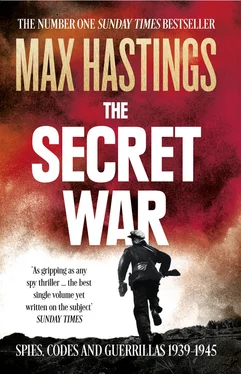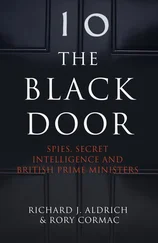Meanwhile Alexander Korotkov was also charged by Moscow to reopen contact with the Harnack/Schulze-Boysen groups. To achieve this, in mid-September he risked repeatedly calling on Harnack at his home. On several occasions he was informed by a housekeeper that Herr Harnack was out. Only on the 16th did Korotkov at last meet his man. Their interview was initially tense, for Harnack was wary. When at last he was convinced of his visitor’s bona fides – if that is not a contradictory term for an NKVD officer – he had plenty to say about his own range of contacts. Most significantly, he told the Russian that he and his friends were convinced that Hitler intended to invade the Soviet Union in the following year, 1941. Back at the embassy, Korotkov messaged Lt. Gen. Pavel Fitin, head of the foreign section of the NKVD in Moscow, under the signature of his nominal boss, Amayak Kobulov, ‘Zakhar’:
Top secret
To comrade Viktor
‘Corporal’ has learned from ‘Albanian’ who has spoken to a top Wehrmacht officer, that Germany intends to initiate a war against the Soviet Union early next year …
16 September 1940
Zakhar
Yet Moscow had reason to be sceptical about these sensational tidings. History shows that they were correct, but on 16 September 1940 Hitler had not yet committed himself. An invasion of Russia was being feverishly debated by prominent Nazis and the army high command. But Operation ‘Barbarossa’ remained a controversial option rather than a settled decision. The fact that Arvid Harnack’s prediction was ultimately fulfilled does not alter the important fact that it remained speculative at a moment when he asserted its finality, as did the earlier report of the ‘Lucy’ Ring’s Alexander Radó. Only in November did Hitler decide.
The affairs of the Berlin NKVD were much complicated by the fact that Korotkov, their best man, was hated and resented by his station chief. The Czech František Moravec, who had extensive dealings with the Russians before the war, has testified to the brutish personalities of most of their intelligence officers. One such, Amayak Kobulov, now ran the NKVD’s Berlin station, where he proved a blunderer more inept than MI6’s Best and Stevens. Kobulov’s only claim on rank was a slavish devotion to the Party hierarchy. Born into a family of Armenian small traders in Tbilisi, he worked as a bookkeeper before joining the security forces in 1927. He owed his survival, and indeed rapid advancement, to his elder brother Bogdan, an intimate of Beria. Kobulov served as a notoriously murderous deputy commissar for Ukraine, and was then appointed to Berlin despite not speaking a word of German. On arrival, he told his staff that he required their absolute subservience. When a young intelligence officer protested about being obliged to serve as the chief’s domestic valet rather than to run agents, his boss threatened to dispatch him to rot in the dungeons of the Lubyanka.
Kobulov also took violent exception to Korotkov, and seized an excuse to return him to Moscow with a highly adverse personal report. Beria, receiving this, summarily sacked the young officer in January 1941. He soon retracted this decision, but for some months Korotkov was confined to desk work in the Lubyanka. Meanwhile Kobulov arranged a personal meeting with Harnack. This encounter went unnoticed by the Gestapo, but could easily have been fatal to the network. At the turn of the year, Centre acknowledged that only Korotkov was competent to handle liaison with its Berlin informants. He was sent back to Germany, with a new brief to pass on to Harnack. The NKVD wanted the German informant’s group to concentrate on economics, not strategy. The NKVD Fifth Department’s orders instructed Korotkov to explore the extent of the German domestic opposition, and how far it might be exploited. Nothing was said about probing Germany’s military intentions towards the Soviet Union – from residual caution lest Harnack prove a Gestapo plant, or find himself under torture.
The order was endorsed in red pencil: ‘Approved by the People’s Commissar. [Pavel] Sudoplatov. 26.12.40.’ Korotkov counter-signed the last page: ‘Read, learned and received as an order. “Stepanov”, 26.12.40.’ He duly passed on the message to the Berlin group, bypassing Kobulov, his nominal chief. Through the months that followed, the Germans delivered a steady flow of intelligence. On 29 January 1941, Harnack reported that the Economics Ministry had been ordered to compile industrial targeting maps of the USSR, similar to those which had been made before the Blitz on Britain. He told Moscow that the head of the Russian Department in Berlin’s Bureau for Foreign Literary Exchanges had been warned for possible duty as a military translator and interpreter; and that the Russian Department of the Economics Ministry was complaining bitterly about shortfalls in promised deliveries of commodities from the USSR, under the terms of the Nazi–Soviet Pact.
Harnack made explicit his own conviction that Hitler was preparing to invade Russia. He also provided copious details on Germany’s economic situation – coal, iron and steel production; synthetic rubber consumption; industrial manpower difficulties, together with German plans to make these good by recruiting workers from occupied Europe – information MI6 would have given rubies to access. Harnack concluded, in terms that weakened his credibility in Moscow, by reverting to gossip: ‘According to Hitler’s circle, he is now in a very unbalanced state, suddenly runs to watch a film during the night, or – as has happened more than once, tore down the curtains in a fit of fury.’ The NKVD’s Berlin station reported to Moscow on 26 February 1941:
Top Secret
To Comrade Viktor
According to information that Harnack obtained from Ernst von Arnim, [Dr Karl] Gördeler’s [anti-Hitler opposition] group has made an attempt to achieve an agreement with the army leadership to form a new German government … The negotiations had a negative result due to the negative reaction from the military leadership. However, according to Ernst, some top generals sympathise with Gördeler’s plan …
Zakhar
The Berlin station was not alone in dispatching warnings to Moscow about the invasion threat: on 7 February 1941 the NKVD’s Third Department cited its source ‘Teffi’ in Ankara as discussing ‘rumours about a possible German offensive against the USSR. According to one version this will only happen after the Germans defeat England. According to another version, which is regarded as more probable, Germany will attack the USSR before striking at England in order to secure its supplies.’ Next day came another report from Harnack, declaring a widespread belief at OKW headquarters that full German occupation of Romania would become a preliminary to an invasion of the USSR. This was followed by a further message early in March, claiming that the worsening food situation in Germany was intensifying the pressure on the Nazi leadership to attack Russia. Col. Gen. Franz Halder, said the Berlin informants, was planning a lightning strike similar to the 1940 French campaign to occupy Ukraine, before the Wehrmacht drove south to seize Stalin’s oilfields. Harnack also described concerns in high places that Germany, instead of profiting economically from invading Russia, would find such a war draining. In another report a few days later, he described intensive Luftwaffe aerial reconnaissance activity over Russia, and operational planning for an offensive that would reach the Urals in forty-five days.
Merkulov, Beria’s deputy, read the 11 March report from Berlin. Like all Soviet officials who wished to survive, he was supremely cautious. Born in 1895, he had worked with Beria in the trans-Caucasian region, and rose yapping at his heels through the Soviet hierarchy; his most recent triumph had been to preside over the massacre of 25,000 Polish officers at Katyn. Now, he demanded of Fitin, ‘Aren’t there other sources on this except Harnack? How can we check the information without letting any informants know what it is? The task should be presented to them in a general and cautious form.’ The March reports from Harnack were correct, though Moscow Centre also received plenty of nonsense. ‘Breitenbach’ reported that the British were preparing to unleash chemical warfare against Germany, and that the Germans intended to use poison gas on the Russians in the event of war. Schulze-Boysen claimed that he ‘knows for sure’ that the American air force attaché in Moscow ‘is a German agent. He passes to the Germans the intelligence data which he, in turn, receives from his contacts in the USSR.’
Читать дальше












